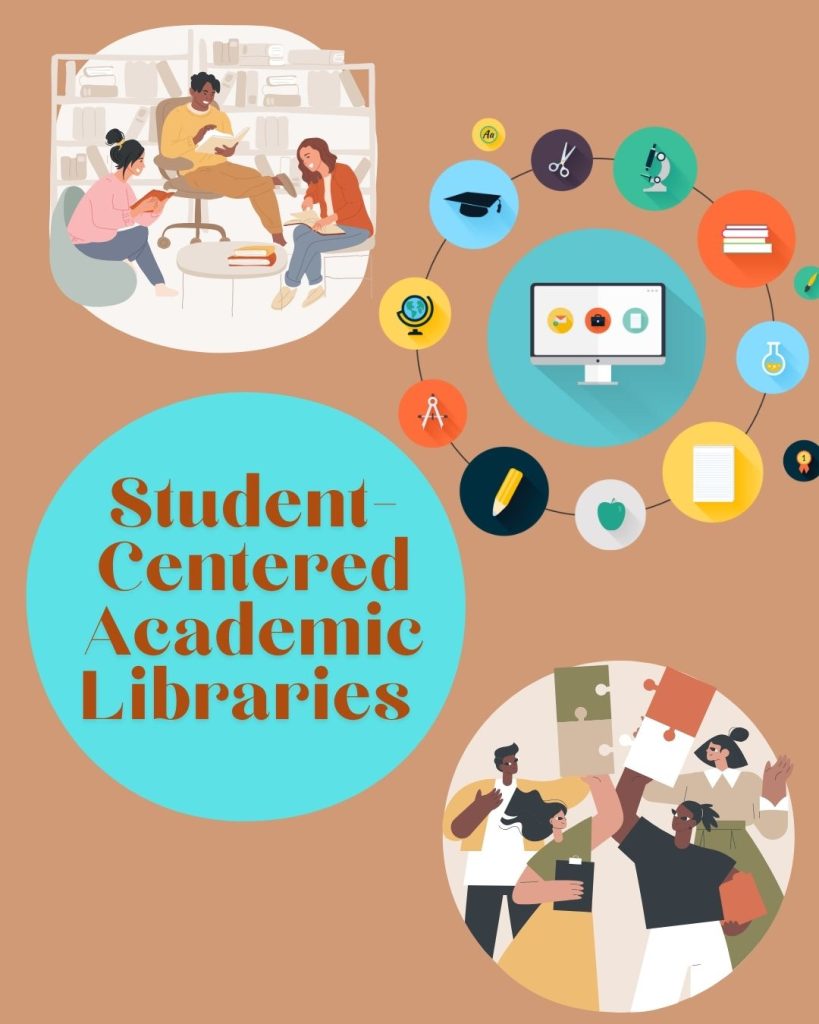
For this module, I explored hyperlinked academic libraries. I really appreciated the initiatives of libraries to create a space that was evolving to understand and function in a way that students really use it. Reading through how academic libraries are becoming more hyperlinked, I learned how they are becoming even more dynamic, welcoming environments and realizing that learning happens in many different forms.
The Hunt Library’s story about going beyond storing books was a great example of this. I loved how the book bot system allowed for more space that was open and collaborative. The writable walls, presentation rooms, and being able to eat and drink at the library seem like great, inclusive spaces for students to learn, relax, and collaborate.
One reading that resonated with me was “Sparking Curiosity: LIbrarians’ Role in Encouraging Exploration,” especially because it was written by librarians from Oregon State University, where I went for my undergrad. I worked at the writing center there, helping students with research papers and other assignments. It was interesting to read about working with first year students to understand the range of experiences and emotions experienced when faced with research papers, and how to encourage more open and curious exploration. In the article, the researchers mentioned an assignment where students had to write metacognitive reflections on their research process. I really like this approach because it encourages students to step back, reflect on their process and learning, and hopefully recognize their growth.
I remember how intimidating it was to choose a research topic and start the research process. I realized that a lot of students, including myself, tend to play it safe, where we pick familiar topics because they felt less risky and to avoid failure, or there are other things going on that demand more attention and time. Reading this article made me reflect on the kind of librarian I want to be. If I work as an academic librarian, I want to help students feel more comfortable with exploring topics or stances they aren’t familiar with, and have skills that empower them to navigate unfamiliar and overwhelming amounts of information with curiosity, critical thinking, and the ability to evaluate their sources.
The researchers from Oregon State asked great questions in their article, like: “Are there aspects of curiosity that can enhance how we design and teach research assignments?” I didn’t think about how we can re-design assignments, they always felt set in stone. It makes me think about how instructors and librarians in a university must work together to set the student up for success throughout their time at the university. Learning such important skills is something that will take time, effort, and struggle, and it’s awesome to see examples of libraries and staff that make the effort to provide such services and spaces to students.
Sources:
Hi Amritha,
I enjoyed hearing your story about how the OSU library helped students pursue their curiosity and make discoveries! Isn’t it the best when that happens?
I relate some of my own experience to why I also hope to land in the type of environment you describe. Some 16 years ago (ouch!), months before I was set to graduate, out of a passion project, I used my college’s library microfilm archive to put together a journalistic series I was working on. Long story short: the microfilm made it happen … a very helpful technician working in the library, and his boss, showed me how to work the machine and how to retrieve, use, and return the film. The stuff I found helped me put together a series of articles that, in effect, got me my first full-time job. Usually still once a year or so, someone will ask me about the series. It just would not have been possible without the academic library staff.
You make a great point about the value in helping a student to be able to tackle a subject they’re not familiar with or lack confidence in approaching. As you’re describing, I think as people who are used to being in a certain environment, we can take it for granted, but I can remember how overwhelming and intimidating my first days on a college campus were, to say nothing of some required G.E. classes. The library can help fill in gaps and boost confidence in those spots.
Hi! That’s so great that your experience and final creation with the help of library staff landed you that job! I think it’s very important that students get that foundation of being confident in their exploration, research, and being able to articulate their ideas and continue to grow from that point onwards.
@amrithaj I enjoyed reading this reflection. This: “I didn’t think about how we can re-design assignments, they always felt set in stone.” I totally understand that thought because I’ve had it as well and I finally realized that assignment should evolve as courses and people evolve. The assignments in this class currently are much different than when I started teaching them. That is an excellent take Away.
@Michael That article really resonated with me, and I was thinking how this class’s assignments really do encourage our curiosity and exploration, especially with the “living” hyperlinked website. I hope to get teaching experience in the future and I would work to make sure that class/assignment design evolves as well!
@amrithaj thank you for the lovely thought on curiosity in this class. I hope you have an opportunity to create similar learning experiences in the future.